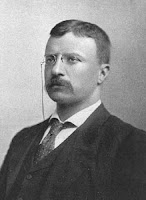Recommended reading
I came across Theodore Roosevelt's autobiography in Google Books this weekend, and as I was looking through the table of contents, the chapter titled "In Cowboy Land" caught my eye.
The eloquence of the descriptive paragraphs that open the chapter surprised me.
It was a land of vast silent spaces, of lonely rivers, and of plains where the wild game stared at the passing horseman. It was a land of scattered ranches, of herds of long-horned cattle, and of reckless riders who unmoved looked in the eyes of life or of death. In that land we led a free and hardy life, with horse and with rifle. We worked under the scorching midsummer sun, when the wide plains shimmered and wavered in the heat; and we knew the freezing misery of riding night guard round the cattle in the late fall round-up. In the soft springtime the stars were glorious in our eyes each night before we fell asleep; and in the winter we rode through blinding blizzards, when the driven snow-dust burnt our faces. (From page 103)
If you like stories of the Old West, I think you'll enjoy this true account of real-life adventures. The chapter relates some of Teddy Roosevelt's experiences as a rancher in what is now southwestern North Dakota. He remembered the region and its people with great affection.
As I read, I realized that Teddy Roosevelt had a good sense of humor. I can imagine this scene very well, and his dry remark at the end of the anecdote amuses me.
Most ranchmen at that time never had milk. I knew more than one ranch with ten thousand head of cattle where there was not a cow that could be milked. We made up our minds that we would be more enterprising. Accordingly, we started to domesticate some of the cows. Our first effort was not successful, chiefly because we did not devote the needed time and patience to the matter. And we found that to race a cow two miles at full speed on horseback, then rope her, throw her, and turn her upside down to milk her, while exhilarating as a pastime, was not productive of results. (From page 107)
Roosevelt wrote that, compared to many of the men he worked with, he was not a good roper or an exceptional horseman. However, he didn't mind laughing at himself.
When the camp was only just across the river, two of the calves positively refused to go any further. [George Meyer] took one of them in his arms, and after some hazardous maneuvering managed to get on his horse, in spite of the objections of the latter, and rode into the river. My calf was too big for such treatment, so in despair I roped it, intending to drag it over. However, as soon as I roped it, the calf started bouncing and bleating, and, owing to some lack of dexterity on my part, suddenly swung round the rear of the horse, bringing the rope under his tail. Down went the tail tight, and the horse "went into figures," as the cow-puncher phrase of that day was. There was a cut bank about four feet high on the hither side of the river, and over this the horse bucked. We went into the water with a splash. With a "pluck" the calf followed, described a parabola in the air, and landed beside us. Fortunately, this took the rope out from under the horse's tail, but left him thoroughly frightened. He could not do much bucking in the stream, for there were one or two places where we had to swim, and the shallows were either sandy or muddy; but across we went, at speed, and the calf made a wake like Pharaoh's army in the Red Sea. (From page 120)
 Roosevelt's years as a Dakota rancher (1884-1886) followed a great tragedy in his life -- the deaths of his wife and mother on the same day (February 14, 1884).
Roosevelt's years as a Dakota rancher (1884-1886) followed a great tragedy in his life -- the deaths of his wife and mother on the same day (February 14, 1884).After Teddy Roosevelt lost many of his cattle in the winter of 1886, he went back east, remarried, fought with his Rough Riders in the Spanish American War, served as governor of New York, served as Vice President under McKinley, and then became President after McKinley died in 1901. He followed up the Presidency with an African safari.
A detailed and interesting timeline of his life can be read at the Theodore Roosevelt Association's website.
1 comment:
I find it interesting that Teddy Roosevelt's wife and mother both died on Feb. 14, 1884.
Feb. 14 also figures prominently in my family. It is my own birthday as well as that of my father's grandmother, Sarah Ann Frazier (Feb. 14, 1855). Feb. 14 is also the day that my father died (Feb. 14, 1971 and the day my father's father died (Feb. 14, 1977).
Post a Comment